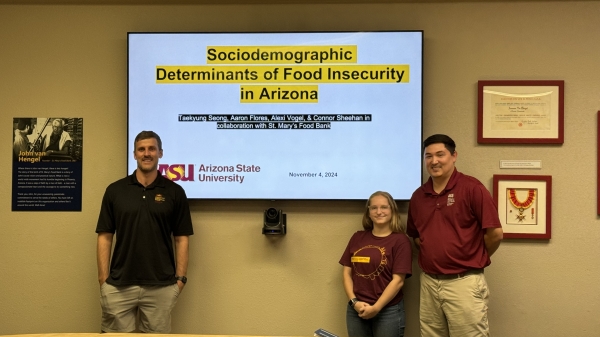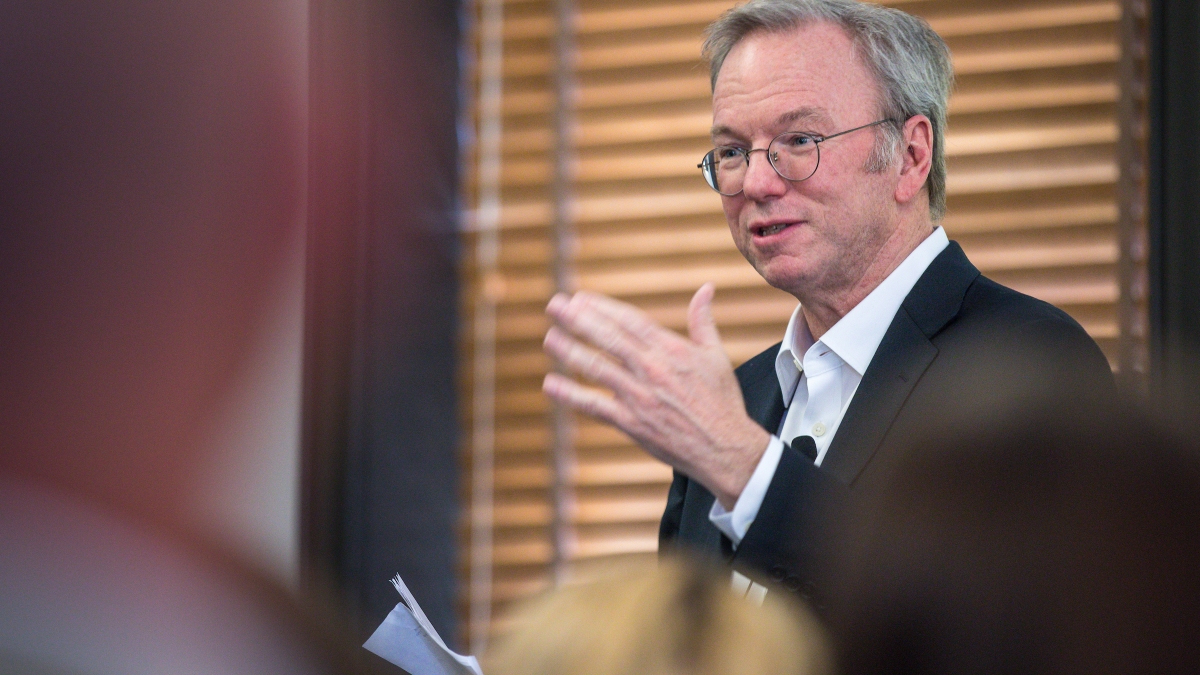We're in a golden era of information, science, and technology, said the executive chairman of Google’s parent company in a recent lecture at Arizona State University.
Eric Schmidt, head of Alphabet Inc. and the architect of Google’s immense infrastructure and product offerings, said science may be under attack, but it’s reaching and improving the lives of more and more people.
“Every time there’s a war on science, science wins,” Schmidt said.
Schmidt was the speaker at the annual Frank Rhodes Lecture Series, which reimagines the role of universities, and his talk was the latest example of ASU exposing students to A-list influencers. Recent speakers on campus have included Steve Wozniak, the co-founder of Apple, and Howard Schultz, the CEO of Starbucks.
Including ASU, Schmidt has spoken at only four schools this year. The others were Princeton, Harvard and MIT.
Schmidt joined Google in 2001 and helped grow it from a Silicon Valley startup to a global leader in technology. He served as the company's chief executive officer until 2011, overseeing the technical and business strategy alongside founders Sergey Brin and Larry Page. Under his leadership Google dramatically scaled its infrastructure and diversified its product offerings while maintaining a culture of innovation.
Over the years, Schmidt said, he's learned that successful leaders “just work harder than anyone else. My core advice is if you want to make something happen, you just have to work harder and you can change the world.”
When at Princeton recently, he looked at where he used a computer as an undergrad.
“It has been replaced by an equal-cost in dollar-adjusted inflation price computer that is 100 million times faster,” he said. “Can you imagine how much better I would have done if I had had a computer 100 million times faster?”
Technology is changing the world, he said.
“I live in a world like you, where I want to be disrupted,” Schmidt said. “A lot of people not only don’t want to be disrupted, they will fight you.”
Everything we know is changing because of technology and science, he said.
“The largest taxi company in the world? They don’t own any taxis. The largest accommodation company owns no accommodations. The largest phone company has no infrastructure. The most valuable retailer has no inventory — Alibaba. What’s the largest movie house? Netflix. It has no movie houses. Every single one of those industries is really upset because they’re getting disrupted by technology.”
The "Frank Rhodes Lecture Series on the Creation of the Future: A Lecture Series for a New American University" began in fall 2011 at the direction of ASU President Michael Crow to help advance his vision for a New American University and the need to redefine the role of higher education in society. Each year an individual with a commitment to institutional innovation will visit ASU to deliver a public lecture on the creation of the future as well as meet with members of the ASU and greater community.
Top photo: Eric Schmidt, executive chairman of Alphabet Inc., the parent company of Google, speaks at the "Frank Rhodes Lecture Series on the Creation of the Future," on Friday, May 12, at the University Club on the Tempe campus. Schmidt talked about the mission of disruptors, such as Uber, Airbnb, Netflix and Alibaba.com, and their critics, especially those who wage war on science. Photo by Charlie Leight/ASU Now
More Science and technology

ASU, St. Mary’s Food Bank partner to tackle food insecurity in Arizona
Arizona State University and St. Mary’s Food Bank (SMFB) have joined forces to create an interactive data dashboard that tracks and maps food insecurity rates across Arizona. This innovative tool…

Study reveals genetic insight into desert survival
The deserts of the American Southwest are home to the Mojave and Sonoran desert tortoises, two seemingly similar yet genetically distinct species of turtles. These tortoises, adapted to different…

Study reveals lasting effects of common weed killer on brain health
Editor’s note: This story is featured in the 2024 year in review.Environmental exposure to toxins in the air, water or certain chemicals can increase the risk of ill health effects,…
